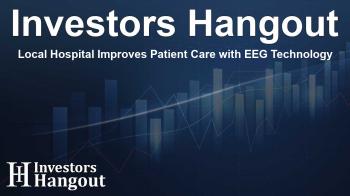Local Hospital Improves Patient Care with EEG Technology

Transforming Local Healthcare with Onsite EEG Services
Zeto, Inc. is thrilled to share the notable impact of its onsite EEG program at Huntsville Memorial Hospital (HMH). This innovative approach has significantly reduced emergency room patient transfers while enhancing access to essential neurological diagnostics for local patients. HMH stands as the only healthcare facility within a 30-mile radius, now providing critical services that once required patients to travel to larger hospitals.
Addressing Community Needs
In response to the increasing volume of neurological transfers, hospital leadership formed a dedicated task force to review emergency room transfer trends. Joe Schorre, Director of Cardiopulmonary and Emergency Management, spearheaded the project. "We scrutinized transfer data from the past two years and identified a recurring need for EEG tests, particularly among patients experiencing neurological issues," explained Schorre. The task force’s objective was clear: to convert these external transfers into local admissions.
Understanding EEG and Its Importance
An EEG, or electroencephalogram, is a vital test that records the brain's electrical activity. It is commonly utilized to diagnose conditions such as seizures and strokes. By incorporating this service on-site, HMH enables quicker and more accurate diagnoses—a significant benefit for the community.
Streamlined EEG Implementation
Recognizing the demand for EEG services in Huntsville and Walker County, HMH sought to implement neurological diagnostics within its facilities. This initiative was part of a larger strategy to develop an inpatient teleneurology program. The result was the effective deployment of a rapid EEG solution from Zeto, which requires no gels or pastes for setup. Respiratory therapists can prepare the equipment within five minutes, making the process incredibly efficient. According to Schorre, "We needed a straightforward solution that our staff could easily use, allowing seamless integration with remote neurologists for patient evaluations."
Positive Outcomes Since Launch
Since launching the EEG program, HMH has welcomed over 40 patients who might have otherwise required distant transfers for care. Patrick Shannon, CEO of HMH, remarked, "Introducing an EEG program here at HMH marks a significant advancement in our capacity to provide care for Walker County residents. Accessing comprehensive services locally eliminates the need for families to travel, lose work time, or endure separation during crucial medical treatments. For many in our rural area, this convenience profoundly impacts their quality of care."
Expanding Access to Neurological Services
The introduction of the EEG service has also paved the way for an outpatient EEG program. Local primary care providers can now refer patients for essential pre-neurology diagnostic testing. Schorre reiterates the importance of timely diagnosis, stating, "We enable patients to have their EEG and MRI completed locally, ensuring they arrive at their neurologist with ready-to-use data. This efficiency decreases wait times and accelerates the path to receiving necessary care."
Future Plans for Enhanced Services
Looking ahead, HMH aims to broaden its services to include continuous EEG monitoring along with enhanced outpatient teleneurology options. Schorre emphasizes the hospital's commitment to community health: "Our focus is on leveraging our resources to benefit our community. Although we lack local neurology specialists, our dedicated staff and the right infrastructure empower us to meet patient needs effectively."
About Huntsville Memorial Hospital
Huntsville Memorial Hospital is a 123-bed, CIHQ-accredited, non-profit acute care community hospital dedicated to improving health outcomes for the residents of Walker County and beyond. Merging compassionate care with advanced medical technology, HMH serves a population exceeding 82,000. Recognized as an American Heart Association Primary Stroke Center, HMH prioritizes community health and wellness. To learn more about the hospital, visit www.huntsvillememorial.com.
Frequently Asked Questions
What is the purpose of the EEG program at Huntsville Memorial Hospital?
The EEG program provides essential neurological diagnostics, improving patient care and decreasing the need for transfers to distant facilities.
How has the EEG program impacted patient care?
Since its inception, the program has admitted over 40 patients who otherwise would have had to transfer, allowing for quicker access to necessary care.
Who leads the EEG program at Huntsville Memorial Hospital?
Joe Schorre, the Director of Cardiopulmonary and Emergency Management, is leading the implementation and management of the EEG services.
What are the future plans for neurological services at HMH?
HMH plans to expand services to include continuous EEG monitoring and outpatient teleneurology consultations.
Why is having EEG services available locally important?
Local EEG services reduce travel burdens for patients, decrease wait times for diagnoses, and allow for more comprehensive care within the community.
About The Author
Contact Kelly Martin privately here. Or send an email with ATTN: Kelly Martin as the subject to contact@investorshangout.com.
About Investors Hangout
Investors Hangout is a leading online stock forum for financial discussion and learning, offering a wide range of free tools and resources. It draws in traders of all levels, who exchange market knowledge, investigate trading tactics, and keep an eye on industry developments in real time. Featuring financial articles, stock message boards, quotes, charts, company profiles, and live news updates. Through cooperative learning and a wealth of informational resources, it helps users from novices creating their first portfolios to experts honing their techniques. Join Investors Hangout today: https://investorshangout.com/
The content of this article is based on factual, publicly available information and does not represent legal, financial, or investment advice. Investors Hangout does not offer financial advice, and the author is not a licensed financial advisor. Consult a qualified advisor before making any financial or investment decisions based on this article. This article should not be considered advice to purchase, sell, or hold any securities or other investments. If any of the material provided here is inaccurate, please contact us for corrections.

